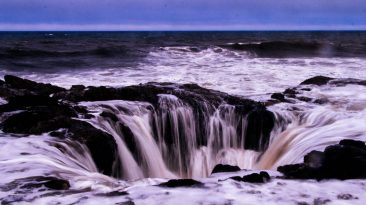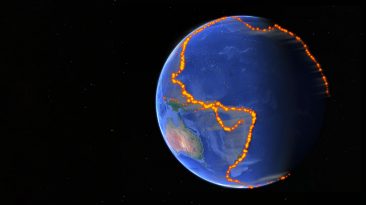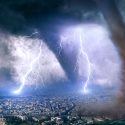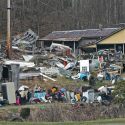Every year, about half a dozen hurricanes reach the United States. With effects ranging from heavy winds and some flooding to the complete decimation of communities, destroying homes and taking lives.
Instead of bracing for impact with our sandbags and survival kits, what if hurricanes never hit land at all? What if we could stop these hurricanes by nuking them?
How would we do it? Could this cause a nuclear apocalypse? Or would a bomb even stop a hurricane?
But first, what exactly are hurricanes? They’re massive storms that form over warm ocean water near the equator.
Hurricanes are tropical storms, the water they form over needs to be above 26°C (79°F) for them to work. This warm water creates humid air, which then gets thrust upwards by tropical winds to create storm clouds. Lighter winds outside the clouds steer them and help them grow.
This cycle keeps happening until the storm has winds of at least 119 km/h (74 mph). At that point, it’s called a hurricane.
They’re usually about 160 km (100 miles) in diameter and can be nearly as large as the size of Texas. The term ‘hurricane’ is only applied to the large storms that form over the Atlantic or the eastern Pacific Ocean; everywhere else they get referred to by their scientific name, tropical cyclones.
Oh yeah, and did we mention these things can last for days? You definitely don’t want this coming to your home, so let’s nuke it!
Believe it or not, the idea of nuking hurricanes isn’t new. It’s been proposed for decades, dating back to the 1950s.
The idea works like this. A submarine would travel underwater to the below of the eye of the storm. Once there, the sub would launch the nuclear bomb, creating an explosion intended to blast out all the hot air and bring in cold air, which is denser.
The cold air would slow down the wind and stop the hurricane. Okay. We have our nuke and are ready to launch
it.
And–well, nothing happened. The hurricane is still there. That can’t be good. The reason nothing would happen is because of the amount of energy a hurricane produces.
According to the National Oceanic and Atmospheric Administration, the heat released from a hurricane is equal to
a 10-megaton nuclear bomb exploding every 20 minutes. In 1990, all of humanity used 20% less energy than a single hurricane produces.
So, the average bombs of today would hardly make a dent on a hurricane. Not only that, the hurricane would carry all that radiation, plutonium and other civilization-destroying materials from the air down to the land.
As if a regular hurricane wasn’t bad enough, we’d now have a radioactive one. As it moved across America, it would
destroy cities with its wind and water, while also dumping radiation on them.
Okay, let’s try this again. But this time we’ll use an even bigger bomb.
And we mean really big. To have enough energy and force to stop a hurricane, you’d need more than 100 atomic bombs.
But to keep it simple, let’s pack all that power into one giant bomb. If we released such a massive bomb, it would surely stop the most epic of hurricanes.
But once the dust settles, you’d quickly realize that you destroyed most of the Earth in the process. So whichever way you attempt it, nuking a hurricane is not a good idea.
And unfortunately, the number of hurricanes continues to increase. Researchers say that the warming of the oceans, due to climate change, is a reason why hurricanes are getting stronger and more frequent.
And no, we can’t nuke that problem either. So maybe, nuking a hurricane isn’t a good idea. In addition to hurricanes people have talked about nuking asteroids and oil spills to stop them from spreading. Man, what’s with humans and nuking stuff?
Subscribe to What-If on Youtube or follow the show on Facebook Watch.
Sources
- “Can You Nuke A Hurricane?”. Weinstein, Adam. 2019. Mother Jones. Accessed August 28 2019.
- “TCFAQ C5c) Why Don’t We Try To Destroy Tropical Cyclones By Nuking”. 2019. aoml.noaa.gov. Accessed August 28 2019.
- “Why Nuking Hurricanes Is A Bad Idea”. 2019. BBC News. Accessed August 28 2019.
- “Trump Suggested Dropping Nuclear Bombs Into Hurricanes To Stop Them From Hitting The U.S.”. Jonathan Swan, and Margaret Talev. 2019. Axios. Accessed August 28 2019.
- “Hurricanes”. 2019. ussartf.org. Accessed August 28 2019.
- “What Are Hurricanes?“. 2019. NASA. Accessed August 28 2019.
- “You can’t nuke a hurricane to stop it, as Trump reportedly suggested. Here’s why” 2019. usatoday.com. Accessed August 28 2019.
- “So, Here’S Why You Probably Don’T Want To Nuke A Hurricane”. 2019. Vice. Accessed August 28 2019.



























